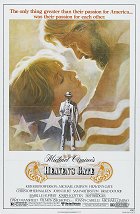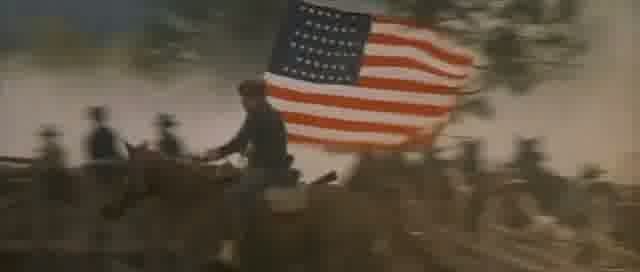Ohjaus:
Michael CiminoKäsikirjoitus:
Michael CiminoKuvaus:
Vilmos ZsigmondSävellys:
David MansfieldNäyttelijät:
Kris Kristofferson, Christopher Walken, John Hurt, Sam Waterston, Brad Dourif, Isabelle Huppert, Joseph Cotten, Paul Koslo, Jeff Bridges (lisää)Juonikuvaukset(1)
This sprawling Western recounts the true story of Wyoming's Johnson County War. When wealthy cattlemen use brutal tactics to drive immigrant settlers of their land, Sheriff James Averill (Kris Kristofferson) intervenes. He clashes with -- and then befriends -- Nathan Champion (Christopher Walken), one of a group of armed mercenaries the cattlemen have hired to "solve" the immigrant problem. (jakelijan virallinen teksti)
(lisää)Arvostelut (3)
A film so epic, monstrously megalomaniacal and auteurishly stupid that it fills me with horror and admiration at the same time. After the Oscar harvest of The Deer Hunter, Cimino lost his judgement and took on the role of a filmmaker who can afford anything, regardless of cost and creative power, but at this point I, as a fan of the sensibly narrated, megalomaniac productions that were made especially in the 1950s and 60s, can only be pleased. This is the last Mohican of good old Hollywood, this is the film that made history, regardless of (or perhaps because of, depending on your point of view) the label of "the biggest movie flop of all time" (watching the Criterion Collection Blu-ray version, 219 min.).
()
... or: How ego, ambition, an unknown actress in the leading female role and Slovak folk music bankrupted United Artists. It seems that over-populated is the only impression that remains with me. During the first thirty minutes so many (absolutely unnecessary) extras promenading around that even Bondarchuk would balk at it. I was afraid that even the intimate scenes would have a couple of hundred actors rolling around in the bed. For all that, the end result isn’t wrecked so much by Cimino’s flamboyant megalomania as by the pure fact that it hid a good genre-subverting hundred-minute movie into a filler-packed, almost four-hour lump of celluloid where he forgot to develop the main trio of characters.
()
Should a film be extolled only because its creator reached inhuman levels of perfectionism and every frame represents the most sophisticated aspects of narrative cinematography? If so, Heaven’s Gate deserves not five, but ten stars. But movies are also subject to a more complex way of communicating with the viewer and I wasn’t always happy watching three and a half hours of poorly portrayed characters twirling on dance floors and the American West, and a love triangle without any emotional basis. The motif of the circle, in which the film wanders throughout (and literally so in the final battle), generates an inimitable feeling of anti-western about the decay of the American dream and the blind journey towards a better future, where Cimino brilliantly demonstrates the immortal power of “Lean’s” pictorial expression – I was often genuinely captivated by the complex structure of the lively mise-en-scène and the framing of static images. Heaven’s Gate is a work of art, but one that produces in the viewer a response similar to an overpriced painting in a gallery: after a while it pisses you off that you can’t have it or touch it. The film has many passages that deserve to be framed and stored in a vault, but also lots of scenes that don’t make much sense and are so long that even a gallery would turn them off before they ended. It is a remarkable film and the last of its kind, but when compared with the similarly genre subversive Once Upon a Time in the West, it’s quite shabby and, unlike Leone’s masterpiece, I don’t think I would like to watch it again. 75%
()

